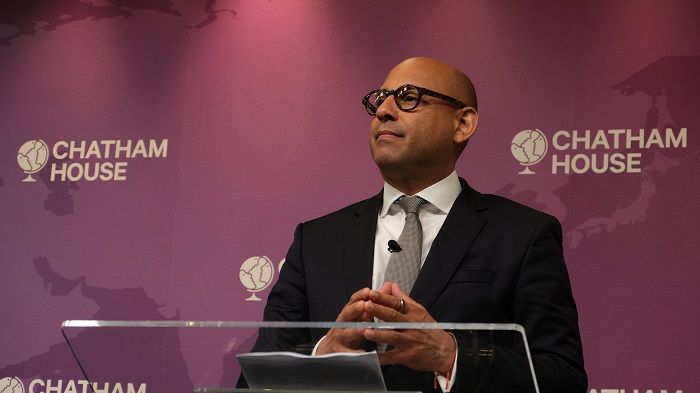Unlocking economic potential: National climate plans as drivers of employment

In a stirring speech delivered at Chatham House in London, UN Climate Change Executive Secretary Simon Stiell issued a compelling call to action, asserting that the next two years are pivotal in the fight against climate change. With an impassioned plea for global cooperation and decisive measures, Stiell outlined the urgency of the climate crisis and laid out a roadmap for averting catastrophic consequences.
Stiell began by acknowledging the dramatic nature of the event's title, "Two years to save the world," recognising that some may view it as overly melodramatic. However, he wasted no time in emphasising the gravity of the situation, citing record-breaking heatwaves, economic upheaval, and the urgent need for decisive action. With the stakes higher than ever, Stiell underscored the critical importance of the next two years in charting a course towards a sustainable future.

Central to Stiell's message was the need for bold and ambitious national climate plans. He stressed that these plans are not only essential for mitigating the impacts of climate change but also present an opportunity for economic growth and job creation. Stiell highlighted the interconnectedness of climate action with broader development goals, emphasising that addressing climate change is fundamental to achieving global prosperity and equity.
Stiell's emphasis on the need for bold and ambitious national climate plans underscores a fundamental aspect of contemporary climate change discourse. National climate plans, often referred to as Nationally Determined Contributions (NDCs), are critical policy frameworks that outline a country's strategy for reducing greenhouse gas emissions and adapting to the impacts of climate change. These plans are submitted by countries to the United Nations Framework Convention on Climate Change (UNFCCC) as part of their commitment to the Paris Agreement.
The call for bold and ambitious national climate plans reflects the recognition that traditional approaches to climate policy may no longer be sufficient given the urgency and scale of the climate crisis. Stiell's assertion that these plans are essential for mitigating the impacts of climate change echoes the scientific consensus that urgent and significant reductions in greenhouse gas emissions are necessary to limit global warming to well below 2 degrees Celsius above pre-industrial levels, as outlined in the Paris Agreement.
However, Stiell goes beyond framing climate action solely as a response to environmental challenges. He highlights the economic opportunities inherent in transitioning to a low-carbon economy. This perspective aligns with the growing recognition of the economic benefits associated with climate action, including job creation in renewable energy industries, improved public health outcomes, and enhanced energy security.
Moreover, Stiell emphasises the interconnectedness of climate action with broader development goals, such as poverty alleviation, food security, and gender equality. This reflects an understanding of the multifaceted nature of the climate crisis and the need for integrated, cross-cutting solutions that address both climate and development challenges simultaneously. By linking climate action to broader development objectives, Stiell underscores the importance of ensuring that climate policies contribute to achieving global prosperity and equity.
Stiell's message underscores the transformative potential of bold and ambitious national climate plans. By framing climate action as an opportunity for economic growth, job creation, and global development, he seeks to mobilise support for ambitious climate policies that not only mitigate the impacts of climate change but also contribute to building a more sustainable, equitable, and prosperous future for all.
A key theme of Stiell's speech was the crucial role of climate finance in enabling countries to implement effective climate plans. He called for a significant increase in climate finance, including concessional finance, debt relief, and reform of development banks. Stiell emphasised the need for developed countries to fulfil their commitments to support developing nations in their climate efforts, underscoring the principle of common but differentiated responsibilities.
Moreover, Stiell emphasised the importance of international cooperation in addressing climate change. He called on institutions like the G7, G20, World Bank, and IMF to mobilise resources and accelerate climate action. Stiell stressed the need for innovative solutions and the importance of transitioning to clean energy while phasing out fossil fuels.
Perhaps most importantly, Stiell underscored the power of individual voices in driving climate action. He urged people everywhere to raise their voices and demand bolder policies from their governments. Stiell's message resonated with the growing public awareness and concern about climate change, emphasising the need for grassroots activism and engagement.
In conclusion, Simon Stiell's speech at Chatham House delivered a powerful and urgent call to action on climate change. By outlining key strategies and emphasising the importance of global cooperation and individual engagement, Stiell inspired hope and mobilised support for the collective effort to save the planet.
---
Follow us on Twitter @AzerNewsAz
Here we are to serve you with news right now. It does not cost much, but worth your attention.
Choose to support open, independent, quality journalism and subscribe on a monthly basis.
By subscribing to our online newspaper, you can have full digital access to all news, analysis, and much more.
You can also follow AzerNEWS on Twitter @AzerNewsAz or Facebook @AzerNewsNewspaper
Thank you!

